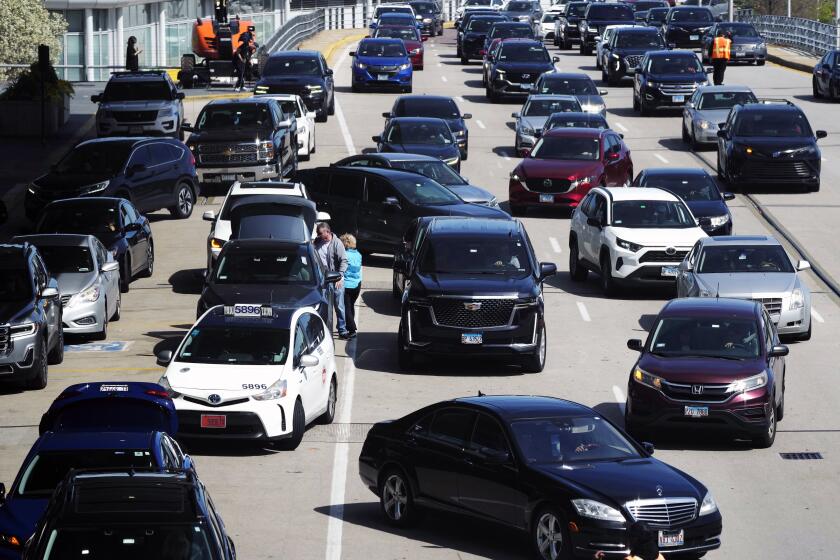Oracle Ready to Take On U.S. Regulators
When the Justice Department announced it would try to thwart Oracle Corp.’s hostile takeover bid for rival business software maker PeopleSoft Inc., many observers assumed the multibillion-dollar deal was dead.
In most cases, companies walk away when their acquisition proposals are contested by the government. In July, no less an authority than Oracle Chief Executive Larry Ellison proclaimed that if federal regulators opposed his company’s bid, it would fail.
But after taking a closer look at the law and the facts, Oracle has decided to fight back in a San Francisco trial set to begin Monday. And people following the case say the Redwood City, Calif., database heavyweight has a decent chance of prevailing.
The major reason: Some of the federal government’s legal theories haven’t been subjected to court scrutiny because so few corporate suitors have stood up to regulators. What’s more, when they have been tested, they haven’t always passed.
“The government is more likely to win,” said Lawrence Fullerton, a former deputy assistant attorney general now in private practice. “But there are some issues, both factual and legal, that could lead to a victory for Oracle.”
The Justice Department has a built-in advantage in how little it has to prove to U.S. District Judge Vaughn Walker. It doesn’t have to show that Oracle has done anything wrong, that it conspired with anyone else to do anything illegal, or that it would become a monopoly supplier of certain kinds of software. All the government has to show, according to rulings in other antitrust cases, is that letting Oracle buy Pleasanton, Calif.-based PeopleSoft would probably lessen competition in the markets for financial-management and human-resources software. That would be the case if the combined company had the power to raise prices by 5% without losing business.
The government contends that the proposed purchase, currently valued at $7.7 billion, would easily meet that definition because Oracle and PeopleSoft are two of the three dominant providers in the market for software that manages such data as accounts receivable, personnel records and employee benefits for big businesses. German company SAP is the market leader.
The policy of opposing mergers when the resulting company would have that kind of market power was adopted by the government in 1992. But it has since lost several cases brought on the basis of so-called unilateral-effects analysis.
Because of the legal uncertainty, “unilateral-effects cases are hard to bring,” said Stanford University economist Roger Noll. “Some courts have said if you have 40% of the market, that’s dominant. Others have said if you have 75%, that’s not enough.”
In the most recent major case, a federal judge in Washington allowed SunGard Data Systems Inc. to buy the disaster-recovery business of Comdisco Inc. for $825 million in 2001 after finding that the market for those services was broader than the government contended. Among other things, the judge wrote that some customers could design their own recovery services, or threaten to do so, if they were confronted with a price increase by the combined company.
After the Justice Department produced statements from 50 customers saying they wouldn’t switch vendors if prices rose, SunGard and Comdisco turned in 90 statements from customers who said they would switch. The judge threw up her hands, ruling that antitrust enforcers hadn’t shown their witnesses were more representative of all the relevant customers.
In a trial brief filed with the San Francisco federal court Tuesday, Oracle likewise said some of the customers cited by the Justice Department didn’t fit the profile of the large, sophisticated companies needing financial and human-resources software in multiple languages that supposedly would be threatened by the merger. Oracle also said the government was making the same mistake it made in the SunGard case by ignoring the customers who might write their own software.
Oracle accused the Justice Department of stretching to invent a marketplace that covers the three biggest business-software companies -- and as few other firms as possible. The product of that invention, Oracle’s attorneys wrote, is “the most confusing, meaningless market definition ever pursued in a government merger challenge.”
The Justice Department and its experts nonetheless say that such customers as Cox Communications Inc., Verizon Communications Inc. and Charles Schwab & Co. would suffer if the merger went through.
“These people believe that there are only three companies that can satisfy their needs,” said a person familiar with the government case.
The fight over what constitutes the market could be crucial, as it was with SunGard and with another merger the government tried unsuccessfully to stop.
In 1993, the Justice Department lost its bid to halt the combination of the country’s No. 2 and No. 3 producers of expensive fountain pens. The judge ruled that the government shouldn’t have drawn the line at pens but should have considered the effects of competition from other high-end writing devices.
The government has had some victories. In 1997, antitrust enforcers at the Federal Trade Commission succeeded in blocking the attempted get-together of Staples Inc. and Office Depot Inc., two of the three chains of office-supply superstores.
The FTC’s analysis held that Staples already was charging 13% more in cities where it was the only superstore, compared with cites where all three chains competed. But as a team of FTC staffers concluded in a later history of the agency’s merger-enforcement efforts, it’s unclear whether that analysis alone would have carried the day.
Instead, the case was largely won on the strength of internal documents produced as evidence, including papers in which the parties unwisely described cities with a single chain as “noncompetitive.”
In the absence of similar bombshell documents, the Oracle case is likely to hinge on what customers say in court.
“The thing the government’s got going for it is that the customers are really against the combination,” said Stanford’s Noll.
“If they can tell war stories about how they played off the competitors against each other, including Oracle, then I think they will win. If they can’t provide those illustrations, then the merger probably shouldn’t be stopped.”






